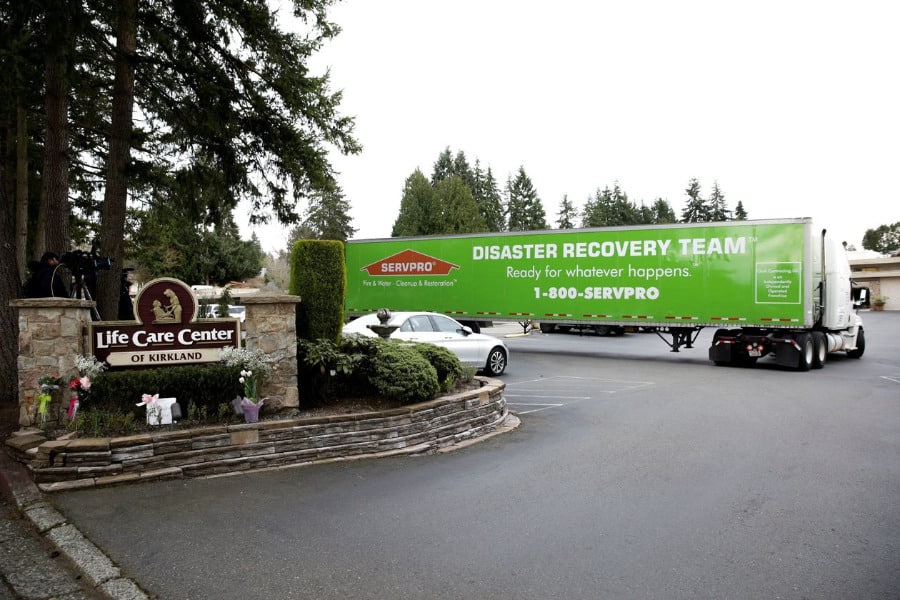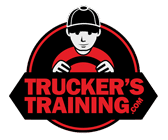With the COVID-19 outbreak, the economy is grinding to a halt. Anyone in a service industry who can’t work from home is facing the greatest risk. One of the most at-risk groups is truckers.

Between not having the option to stop working and self-isolate, and traveling constantly, truckers have a lot to worry about. Amid that and the changes brought by a surge in demand, and restrictions being changed to handle the need, anyone in the trucking industry has a lot to consider.
The Risk for Truckers During Covid-19 Pandemic
Besides constantly being around the public thanks to living on the road, in ways from having to buy their food on the road and having to rely on truck stops for showers and other services, your average trucker passes through many spaces with the potential to spread the virus. While you don’t get much in-person contact, shared spaces and cross-contamination is always possible.
According to the CDC, the Covid-19 spreads primarily from person to person – between those who are in close contact (within 6 feet), and through respiratory droplets generated when someone infected sneezes or coughs.
All it takes is one person coughing or sneezing on you or nearby you to potentially catch the virus. Add in that truckers are less likely to have health insurance. Many also have risk factors like smoking or heart conditions and you’re looking at potential disaster for anyone who works in this essential field.
The Effects COVID-19 Can Have on the Trucking Industry
Not only could this be bad for warehouse workers and other people essential to the business, but truckers also face their own hurdles.
If COVID-19 starts spreading along truck stops, you’re looking at the whole supply chain for retail grinding to a halt. If enough truckers get sick, no one can drive the supplies. You need specialized training to drive a truck and fewer and fewer people have been entering the industry.
Since most places carry limited stock, as has been proven by the panic buying people have been engaging in, fewer truckers mean grocery stores and other retail locations will run out of stock with big delays to restocking. This would be very bad both for retail and consumers.
Will This Change Demand for Truckers?

Yes, not only are people switching to using online ordering for household supplies to avoid being in public, but panic buying and needs for supplies to respond to the outbreak will mean truckers are in more demand than ever.
Amazon recently announced that they are adding 100,000 full-time and part-time workers at the fulfillment centers and its delivery network.
As of March 13, 2020, the U.S. Department of Transportation’s Federal Motor Carrier Safety Administration (FMCSA) are suspending the hours-of-service (HOS) truck driving limits to help speed the response to the disease and get critical supplies to affected areas.
What Happens if You Get Sick?
It’s important for anyone who might be infected to follow CDC recommendations and stay home for mild cases. If more serious symptoms appear, contact your doctor and get yourself treatment promptly.
How Long Will You Be Out of Work?
Symptoms can last for up to 14 days in mild cases, and it can be longer to test clear of the virus since its incubation period is 14 days. If it develops into pneumonia, you’re looking at far more time off. With a mild case, you can stay home, but if the more serious symptoms appear like lethargy or weakness you’ll be in the hospital.
Around 80% of cases are mild according to a study published by the China CDC Weekly. However, 2 weeks off of work can be devastating not only physically and mentally, but also financially, given some employers don’t guarantee sick leave and many truckers don’t have any. Also, truckers are twice as likely as the average worker to lack health insurance, a serious case could result in major costs.
Precautions Truckers can Take

Besides the common disease prevention tips of washing hands, sneezing into your elbow, and similar tips, the CDC has a page on prevention. For truckers, keep an eye out for communities where the virus is spreading.
- Avoiding the areas you don’t need to travel through could help you. If you do international trucking, checking for travel restrictions is a good idea. While you might avoid the most high-risk areas like airports, you should still watch out.
- Carrying at least a 60% alcohol hand sanitizer and your own disinfecting wipes can help when you need to stop at places like truck stops with high turnovers of people.
- Wiping down surfaces before you touch them can kill the virus. Just look for ones proven to kill viruses.
- For areas like showers, wearing shower shoes and using a good antibacterial soap can help.
- Avoiding any large gatherings is also a good idea.
- Stick with mobile ordering and other ways to avoid being around people as much as you can when on the road.
- If you feel even slightly ill, be sure to isolate yourself as soon as you safely can.
Conclusion
During this pandemic, truckers and the entire industry are some of the most important players in helping contain the disease. Between carrying necessary supplies and equipment and making sure they don’t spread the disease, truckers are the unsung heroes of the moment. Just keep yourself safe and keep yourself informed.
Important Sources of Information for Truckers
Share in the comments what you’re experiencing on the road? Are you one of the truckers delivering essential supplies?

Geoff is a freelance writer at TruckersTraining.com with 20+ years of experience driving trucks and buses, dispatching, supervising, and training commercial driving teams. His expertise is writing topics on the transportation and trucking industry, and information technology trends.
